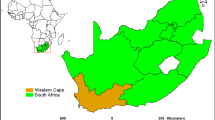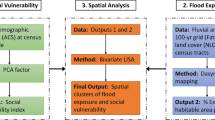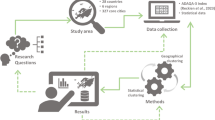Abstract
Climate-related extreme weather events can result in the loss of drinking water access. We assessed the relative vulnerability of 3143 United States (U.S.) counties to loss of drinking water access due to droughts, floods, and cyclones. Five vulnerability assessment models from the literature were compared, each differing in the aggregation method used to combine the three determinants of vulnerability (V) – exposure (E), sensitivity (S), and adaptive capacity (AC). Exposure scores were calculated using historical occurrence data, sensitivity scores were determined from the intrinsic resilience of the drinking water technologies, and adaptive capacity scores were calculated from nine socioeconomic indicators. Our results showed that models V = E + S + AC and V = E + S–AC were the same, as were models V = E × S × AC and V = E × S ÷ AC. Between these two model forms (form 1: V = E + S + AC and V = E + S–AC; form 2: V = E × S × AC and V = E × S ÷ AC), scores from one model form could be used to predict scores from the second model form, with R-squared values ranging from 0.61 to 0.82 depending on the extreme weather event type. A fifth model, V = (E–AC) × S was not found to correlate with any of the other four models. We used V = E + S + AC as our reference model as this resulted in a more uniform distribution of counties in each of the five intervals of vulnerability. Comparing the vulnerability scores identified the counties with greatest vulnerability to losing access to drinking water due to floods, droughts, and cyclones. Our results can be used to inform evidence-based decisions such as allocation of resources and implementation of adaptation strategies.


Similar content being viewed by others
References
Adger WN, Vincent K (2005) Uncertainty in adaptive capacity. Compt Rendus Geosci 337:399–410
Al-Jeneid S, Bahnassy M, Nasr S et al (2007) Vulnerability assessment and adaptation to the impacts of sea level rise on the Kingdom of Bahrain. Mitig Adapt Strateg Glob Chang 13:87–104
Antwi-Agyei P, Fraser EDG, Dougill AJ et al (2012) Mapping the vulnerability of crop production to drought in Ghana using rainfall, yield and socioeconomic data. Appl Geogr 32:324–334
Balica SF, Douben N, Wright NG (2009) Flood vulnerability indices at varying spatial scales. Water Sci Technol J Int Assoc Water Pollut Res 60:2571–2580
Banerjee, O. (2012). Evaluating country-level population vulnerabilities to water access due to climate related hazards using high spatial resolution methods. BS Thesis, University of North Carolina at Chapel Hill, Chapel Hill, NC.
Borden KA, Schmidtlein MC, Emrich CT et al (2007) Vulnerability of U.S. cities to environmental hazards. J Homeland Secur Emerg Manag 4(2), article 5
Brooks N, Adger WN, Kelly PM (2005) The determinants of vulnerability and adaptive capacity at the national level and the implications for adaptation. Glob Environ Chang 15:151–163
Centers for Disease Control and Prevention (CDC) (2012). Public Health Preparedness: 2012 State-By-State Report on Laboratory, Emergency Operations Coordination, and Emergency Public Information and Warning Capabilities. Available at: http://www.cdc.gov/phpr/pubs-links/2012/documents/2012State-By-State_Preparedness_Report.pdf. Accessed 21 Feb 2013
Charles, K., Pond, K., Pedley, S. et al. (2010). Vision 2030 The resilience of water supply and sanitation in the face of climate change: Technology projection study. Available at: http://www.who.int/water_sanitation_health/publications/vision_2030_technology_projection_report.pdf. Accessed 04 Jan 2014
Chou, B. (2012). Ready or not: An evaluation of state climate and water preparedness planning, natural resources defense council document. Available at: http://www.nrdc.org/water/readiness/files/Water-Readiness-full-report.pdf. Accessed 07 Feb 2014
Cinner JE, McClanahan TR, Graham NAJ et al (2012) Vulnerability of coastal communities to key impacts of climate change on coral reef fisheries. Glob Environ Chang 22:12–20
Corobov, R., Sirodoev, I., Koeppel, S. et al. (2013). Assessment of climate change vulnerability at the local level: a case study on the Dniester River Basin (Moldova). The Scientific World Journal : article ID 173794.
Demirkesen AC, Evrendilek F, Berberoglu S (2008) Quantifying coastal inundation vulnerability of Turkey to sea-level rise. Environ Monit Assess 138:101–106
Döll P (2009) Vulnerability to the impact of climate change on renewable groundwater resources: a global-scale assessment. Environ Res Lett 4:035006
Federal Communications Commission (2012). Eighth Broadband Progress Report. Available at: http://www.fcc.gov/document/progress-made-broadband-deployment-availability-gaps-remain. Accessed 4 Feb 2013
Ferrier N, Haque CE (2003) Hazards risk assessment methodology for emergency managers: a standardized framework for application. Nat Hazards 28:271–290
Gbetibouo GA, Ringler C, Hassan R (2010) Vulnerability of the South African farming sector to climate change and variability: an indicator approach. Nat Res Forum 34:175–187
Hahn MB, Riederer AM, Foster SO (2009) The Livelihood Vulnerability Index: a pragmatic approach to assessing risks from climate variability and change—a case study in Mozambique. Glob Environ Chang 19:74–88
Iglesias A, Garrote L, Cancelliere A et al (eds) (2009) Coping with drought risk in agriculture and water supply systems. Spring Science+Business Media B.V, The Netherlands
Institute for Health Metrics and Evaluation (2014). Left behind: Widening disparities for males and females in US county life expectancy, 1985–2010. Available at: http://www.healthdata.org/research-article/left-behind-widening-disparities-males-and-females-us-county-life-expectancy-1985. Accessed 15 Jul 2014
Intergovernmental Panel on Climate Change (IPCC) (2007). Climate Change 2007: Impacts, Adaptation and Vulnerability. Group II Contribution to the Fourth Assessment Report of the Intergovernmental Panel on Climate Change. Available at: http://www.ipcc.ch/publications_and_data/ar4/wg2/en/contents.html
Intergovernmental Panel on Climate Change (IPCC) (2008). Climate change and water: IPCC Technical Paper VI. Available at: https://www.ipcc.ch/publications_and_data/publications_and_data_technical_papers.shtml
Intergovernmental Panel on Climate Change (IPCC) (2013). Climate Change 2013: The Physical Science Basis. Working Group I Contribution to the Fifth Assessment Report of the Intergovernmental Panel on Climate Change. Available at: http://www.ipcc.ch/report/ar5/wg1/
Intergovernmental Panel on Climate Change (IPCC) (2014). Climate Change 2014: Impacts, Adaptation, and Vulnerability. Summary for Policymakers. Working Group II Contribution to the Fifth Assessment Report of the Intergovernmental Panel on Climate Change. Available at: http://www.ipcc.ch/report/ar5/wg2/
Islam MS, Brooks A, Kabir MS et al (2007) Faecal contamination of drinking water sources of Dhaka city during the 2004 flood in Bangladesh and use of disinfectants for water treatment. J Appl Microbiol 103:80–87
Kistemann T, Claben T, Koch C et al (2002) Microbial load of drinking water reservoir tributaries during extreme rainfall and runoff. Appl Environ Microbiol 68:2188–2197
Kleinosky LR, Yarnal B, Fisher A (2006) Vulnerability of Hampton Roads, Virginia to storm-surge flooding and sea-level rise. Nat Hazards 40:43–70
Levi, J., Vinter, S., Gratale, D., et al. (2009). Health Problems Heat Up: Climate Change and The Public’s Health. Available at: http://healthyamericans.org/reports/environment/TFAHClimateChangeWeb.pdf. Accessed 20 Jan 2013
Mosley LM, Sharp DS, Singh S (2004) Effects of a tropical cyclone on the drinking-water quality of a remote Pacific island. Disasters 28:405–417
National Oceanic and Atmospheric Administration (NOAA) National Climatic Data Center (2012). Storm Events Database. Available at: http://www.ncdc.noaa.gov/stormevents/ftp.jsp. Accessed 29 Jan 2013
National Oceanic and Atmospheric Administration (NOAA). National Climatic Data Center (2013) Storm Data FAQ Page. Available at: http://www.ncdc.noaa.gov/stormevents/faq.jsp. Accessed 8 Oct 2013
National Science Foundation (2014). Science and Engineering Indicators 2014: Financial Research and Development Outputs R&D as a Percentage of Gross Domestic Product. Available at: http://www.nsf.gov/statistics/seind14/index.cfm/chapter-8/c8s4o40.htm. Accessed 15 Jul 2014
Perch-Nielsen SL (2010) The vulnerability of beach tourism to climate change—an index approach. Clim Chang 100:579–606
Pollard SJT (2008) Risk management for water and wastewater utilities. IWA Publishing, London
Preston BL, Yuen EJ, Westaway RM (2011) Putting vulnerability to climate change on the map: a review of approaches, benefits, and risks. Sustain Sci 6:177–202
Queensland Urban Utilities (2014). Water service interruptions. Available at: http://www.urbanutilities.com.au/faults-and-interruptions/water-service-interruptions. Accessed 24 Nov 2014
San Jose Water Company (2014). Service Interruptions. Available at: http://www.sjwater.com/for_your_home/home_customer_care/service_interruptions/. Accessed 24 Nov 2014
Shah KU, Dulal HB, Johnson C et al (2013) Understanding livelihood vulnerability to climate change: applying the livelihood vulnerability index in Trinidad and Tobago. Geoforum 47:125–137
Silva BKN, Lucio PS (2014) Indicator of agriculture vulnerability to climatic extremes. A conceptual model with case study for the northeast Brazil. Atmos Clim Sci 2:334–345
Sullivan C, Meigh J (2005) Targeting attention on local vulnerabilities using an integrated index approach: the example of the climate vulnerability index. Water Sci Technol J Int Assoc Water Pollut Res 51:69–78
The City of Calgary (2014). Water main and water pipe breaks. Available at: http://www.calgary.ca/UEP/Water/Pages/construction-projects/Water-main-repairs-and-maintenance/Water-Main-Breaks-FAQ.aspx. Accessed 24 Nov 2014
The New York Times (2014). Thousands without water after spill in West Virginia. Available at: http://www.nytimes.com/2014/01/11/us/west-virginia-chemical-spill.html?_r=0. Accessed 26 Nov 2014
U.S. Geological Survey (USGS) (2013). Estimated use of water in the United States county-level data for 2005. Available at: http://water.usgs.gov/watuse/data/2005/. Accessed 23 Mar 2013
United States Census Bureau (2013). TIGER/Line Shapefiles and TIGER/Line Files. Available at: https://www.census.gov/geo/maps-data/data/tiger-line.html. Accessed 20 Mar 2013
United States Census Bureau (2014). American Community Survey. Available at: http://factfinder2.census.gov. Accessed 30 Oct 2014
United States Environmental Protection Agency (USEPA) (2012). SDWISFED Drinking Water Data. Available at: http://water.epa.gov/scitech/datait/databases/drink/sdwisfed/pivottables.cfm#summary. Accessed 20 Mar 2013
Yohe G, Tol RSJ (2002) Indicators for social and economic coping capacity—moving toward a working definition of adaptive capacity. Glob Environ Chang 12:25–40
Yusuf, A. A., Francisco, H. (2010). Hotspots! Mapping climate change vulnerability in Southeast Asia. Available at: http://www.eepsea.org/o-k2/view-item/id-432/Itemid-389/
Acknowledgments
This study was made possible by the generous support of the Wells Fargo Foundation. Tucker Witsil was supported by the Cooperative Agreement Number 1UE1EH001126 from The Centers for Disease Control and Prevention. Its contents are solely the responsibility of the authors and do not necessarily represent the official views of the Centers for Disease Control and Prevention. The contents of the paper also do not necessarily represent the official views of the Wells Fargo Foundation or the University of North Carolina at Chapel Hill.
Author information
Authors and Affiliations
Corresponding authors
Electronic supplementary material
Below is the link to the electronic supplementary material.
ESM 1
(PDF 3556 kb)
Rights and permissions
About this article
Cite this article
Luh, J., Christenson, E.C., Toregozhina, A. et al. Vulnerability assessment for loss of access to drinking water due to extreme weather events. Climatic Change 133, 665–679 (2015). https://doi.org/10.1007/s10584-015-1493-0
Received:
Accepted:
Published:
Issue Date:
DOI: https://doi.org/10.1007/s10584-015-1493-0




